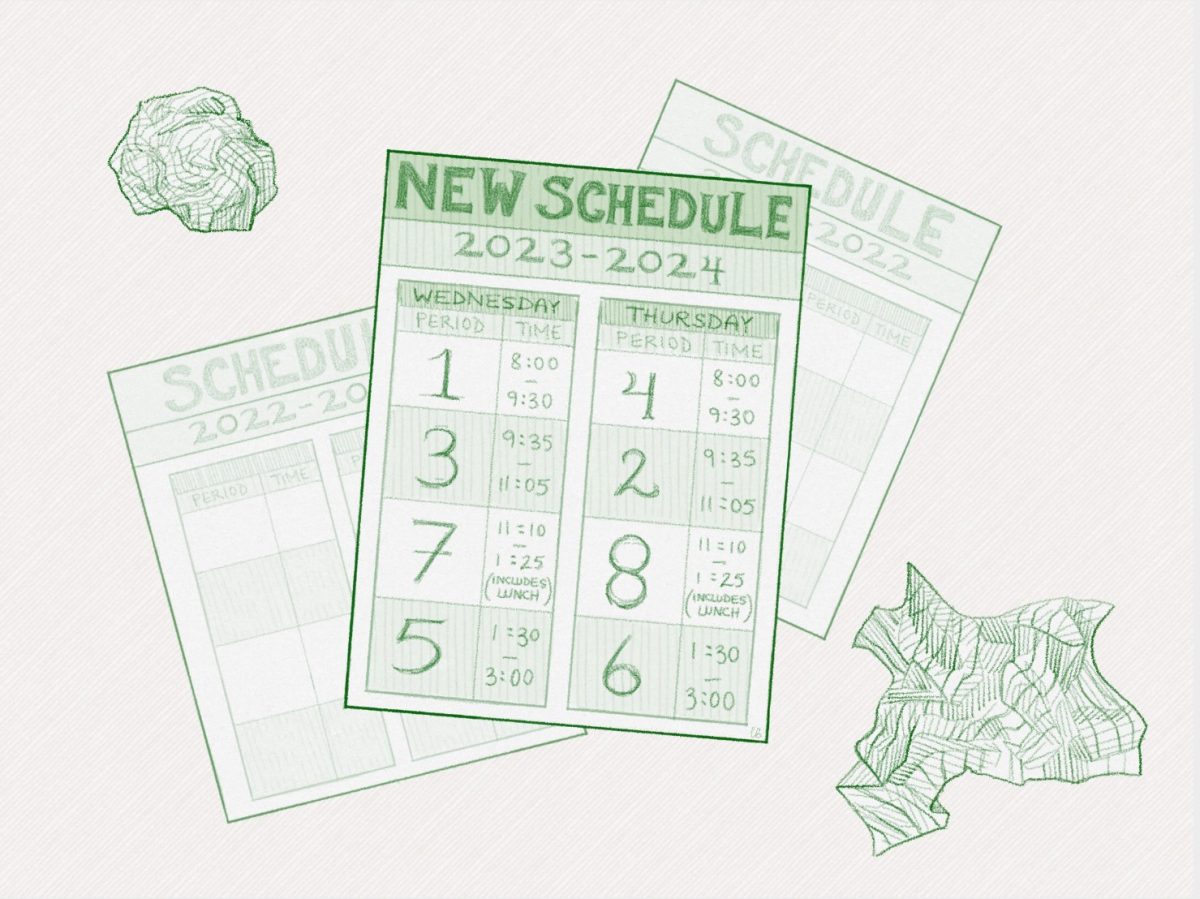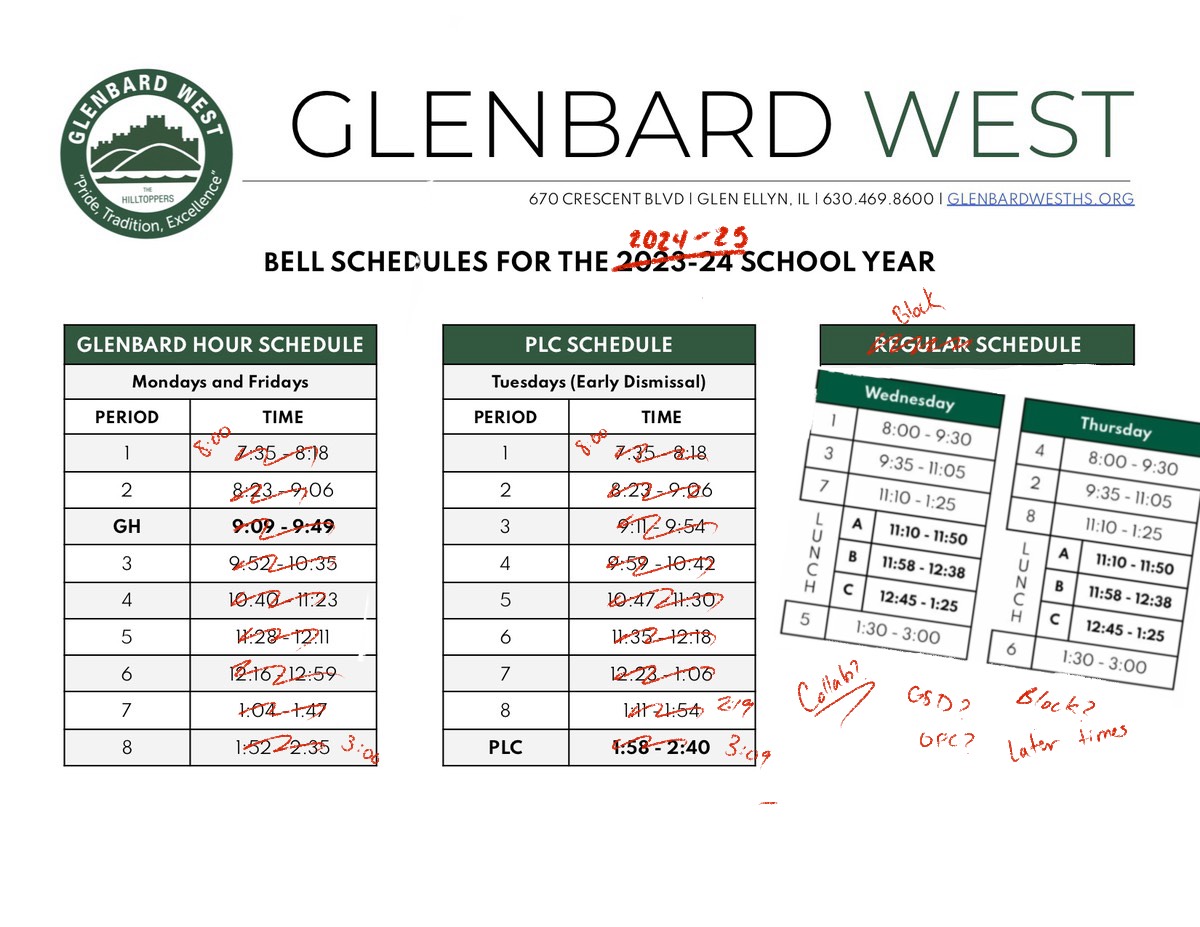Glenbard District 87 plans to implement the 2024-25 school schedule to include block periods on Wednesdays and Thursdays. It is crucial to weigh the potential consequences of this change and determine if it will truly benefit the Glenbard student body in the long run.
Overview of Block Scheduling
There are two main types of block schedules: the 4×4 semester plans and hybrids, despite the numerous variations worldwide. The 4×4 semester plan consists of four 90-minute periods each day, accompanied by approximately 45 minutes for lunch. On the other hand, the hybrid schedule combines elements of traditional eight-to-nine-period days with the structure of a 4×4 semester plan. This results in some school days featuring eight-to-nine 40-minute periods, while others incorporate four 90-minute periods, rendering both the 4×4 block schedule and the hybrid schedule as conventional block schedules.
School schedule reform has been a topic of great interest for nearly eight decades. An article published by the University of West Georgia, Robert C. Morris, professor of secondary education, summarized that “…scheduling affects such thing[s] as climate, staff morale and most importantly student achievement.” With the confirmed hybrid block change, it is imperative that the chosen block schedule be thoroughly analyzed and understood.
Glenbard Schedule
Though it is by no means perfect, block scheduling has vital benefits. Dr. Nessa Sasser of the Seattle P-I notes that block schedules benefit lab-based classes such as physics and chemistry by allowing for more extensive, in-depth group work time for students. Maximizing academic learning time enables students to engage in immersive activities such as music, art, or sports, giving them vital practice time to ensure deeper learning and overall success. Furthermore, the Glenbard Board of Education President Margeret DeLaRosa remarked on the schedule change and its benefits in a letter sent out following the approval of the new schedule by the Glenbard Education Association (GEA): “this school day change moves us closer to providing early college experience for more students through Advanced Placement and dual credit courses and achieving our vision of our Profile of a Graduate.” GEA President Kevin Sutton was quoted in the same letter, stating hopefully that the “new school day schedule[…]will benefit our students.”
The Glenbard administration proposed and approved a hybrid block schedule for all four high schools. Schools will follow the traditional eight-period schedule for Monday, Tuesday, and Friday. Parts of the schedule like Glenbard Hour and PLC will continue as normal. A block schedule will be implemented on Wednesdays and Thursdays; periods one, three, seven, and five will take place on Wednesday, and periods four, two, eight, and six on Thursday, all periods in that order.

In a further update on the District 87 website, administration stated that the new block schedule, along with the continuation of Glenbard hour, will buffer this concern to work to ensure that student support needs are met. The update reaffirmed that the block schedule is in students’ best interests, suggesting that it positively impacts “complex problem-solving, critical thinking, creativity, and coordination”, which have been the “top skills required for success since 2022”.
Glenbard West Outlook
Glenbard West and the other Glenbard schools are currently set to begin the 2024-25 school year on Thursday August 15th, a block schedule day. In an interview, however, Glenbard West Principal Ben Peterselli explained that “we will not [start on a block schedule day]” but rather a normal eight-period day because “there is not an instructional advantage to starting with 90-minute blocks.” This means there will likely be an omission of the block schedule for the first week of the upcoming school year. Additionally, Mr. Peterselli stated that “a lot of the details [on the schedule] are still being worked out across the district and how it would specifically affect us here at Glenbard West,” acknowledging that there could very well be further minor changes to the upcoming schedule.
Another alteration to next year’s schedule is the start time of the school day. In a communication by District 87, superintendent Dr. David Larson stated that for the 2024-25 school year the start time will be moved to 8:00 a.m. The latter was confirmed at the February 5th board meeting, along with a switch of bus companies to ease the major change.
Lunch Period Logistics
The Glenbard Updates, a document sent out following the introduction to the Hybrid Block proposal, stated that during a block on Wednesday, seventh period will be 90 minutes plus an additional 45 minutes for lunch. The same applies to the eighth period on Thursday. How will this play out, though? Mr. Peterselli said that “students will have two different[…]lunch designations. For eight-period days, they will have a fourth, fifth, or sixth period [lunch]. It is very similar to what is going on now, except that there will be one fewer lunch period.” On block days, though, he said students “ will have an A, B, or C lunch.[…]All lunch periods will exist during the third block. An A lunch will have lunch at the beginning of the block, a B lunch will have lunch halfway through their third block, and a C lunch will have lunch [in the last 45 minutes of] their third block.”

The planned reduction of lunch periods, from four to three, could cause crowded conditions. Mr. Peterselli acknowledged that spacing is a complicated topic, especially at West. However, he corrected that lunch periods are not so full as to not be able to fit more students; some could accommodate many more than they already do. In addition, the use of the Biester Gym foyer, Elliott Café, the science bridge, and other various locations around the school will ensure that there is at least some capability of extra spacing. Mr. Peterselli also referred to the ongoing District 87 referendum stating “that [Glenbard West] requires some renovations and additions [that] will probably be attached to some sort of referendum.” which will also address more outlined issues for all Glenbard schools. .
Another detail to consider is the issue of what should be done on block days with the periods that on non-block days are for lunch. Mr. Peterselli expressed concern when he said, “Well, not sure. What kind of structured activities we might offer will probably grow over time.” He furthermore reiterated that this process is still in progress; “we’ll be developing some ideas, we’ll be getting some feedback from kids, and then, you know, much like the beginning of this school year, we’ll be pushing out a ton of communication to people so that they understand kind of what is and what isn’t possible during that time.” Later, Mr. Peterselli said that if students were allowed to leave early or arrive late, a point many are eager for, it would be with strings attached and would not be available to all grade levels.
While some argue in favor of traditional eight-to-nine-period school days, others champion block schedules as constructive, positive changes. However, there remain valid concerns about the effectiveness of block schedules. Extended class time could negatively impact student attention and engagement, potentially overwhelming students with coursework that spans a full 90 minutes as mentioned by Dr. Sasser. Moreover, absent students could more often be subjected to needing extra help to catch up on coursework, even more so than currently.
Therefore, it is essential to carefully consider the potential drawbacks of block schedules before deciding which approach is best for a given school or student population. District 87 has taken this into account in planning for the coming academic year. While some students and staff may be concerned about the upcoming schedule changes. These concerns could be offset by trusting in the district’s ability to problem-solve potential issues and relish any potential benefits this system may have on the academic environment.











